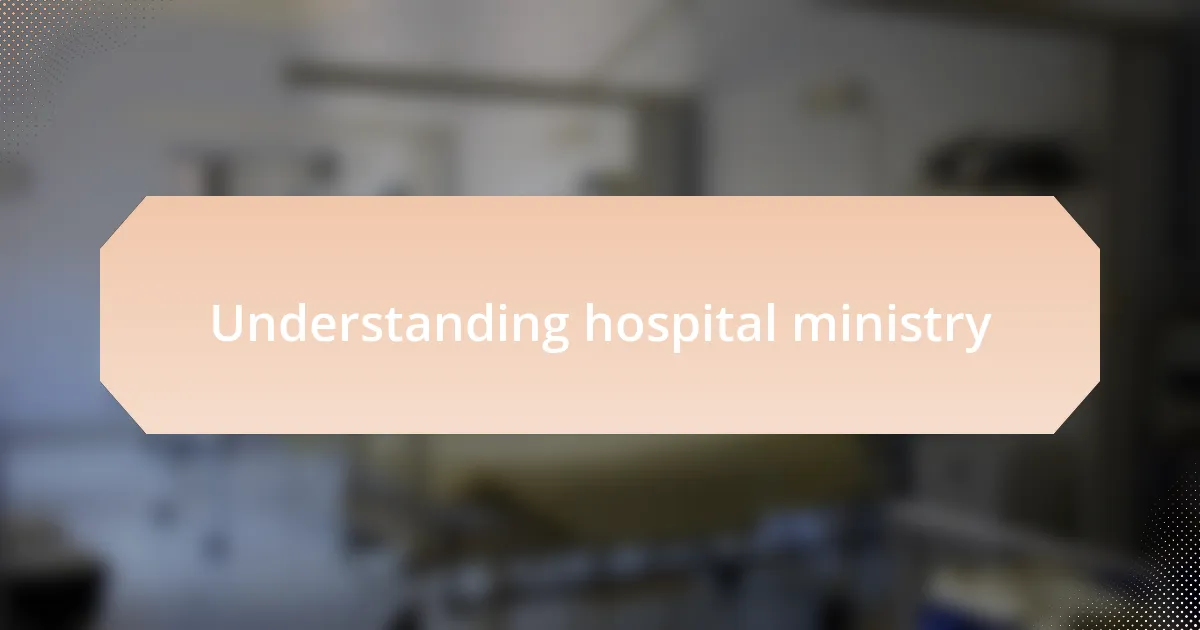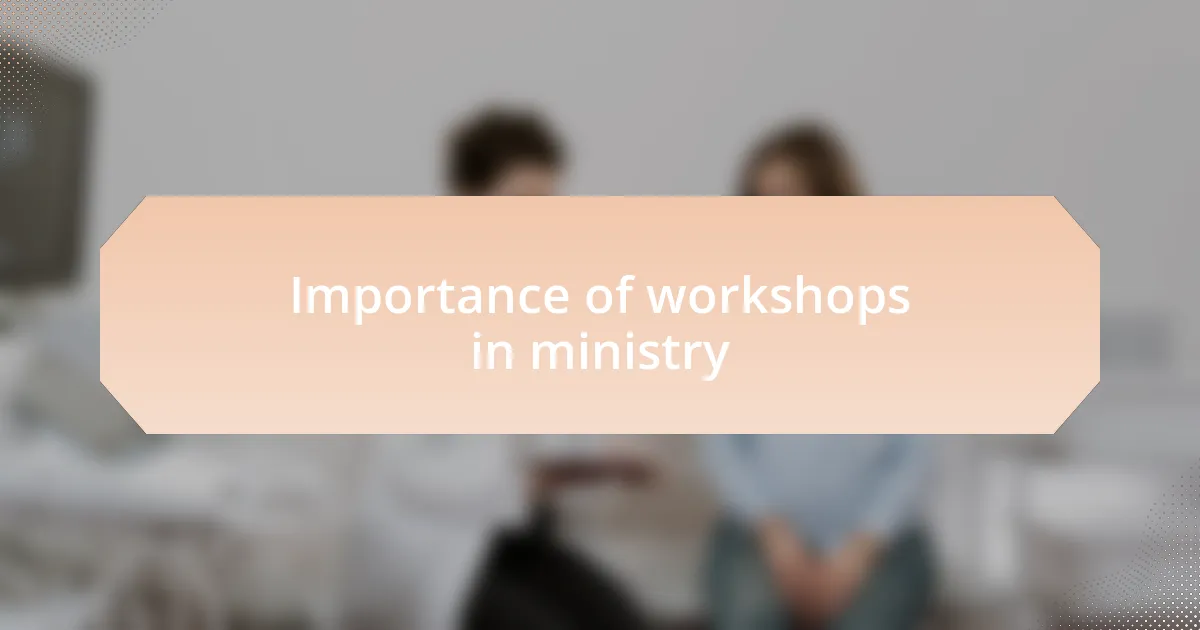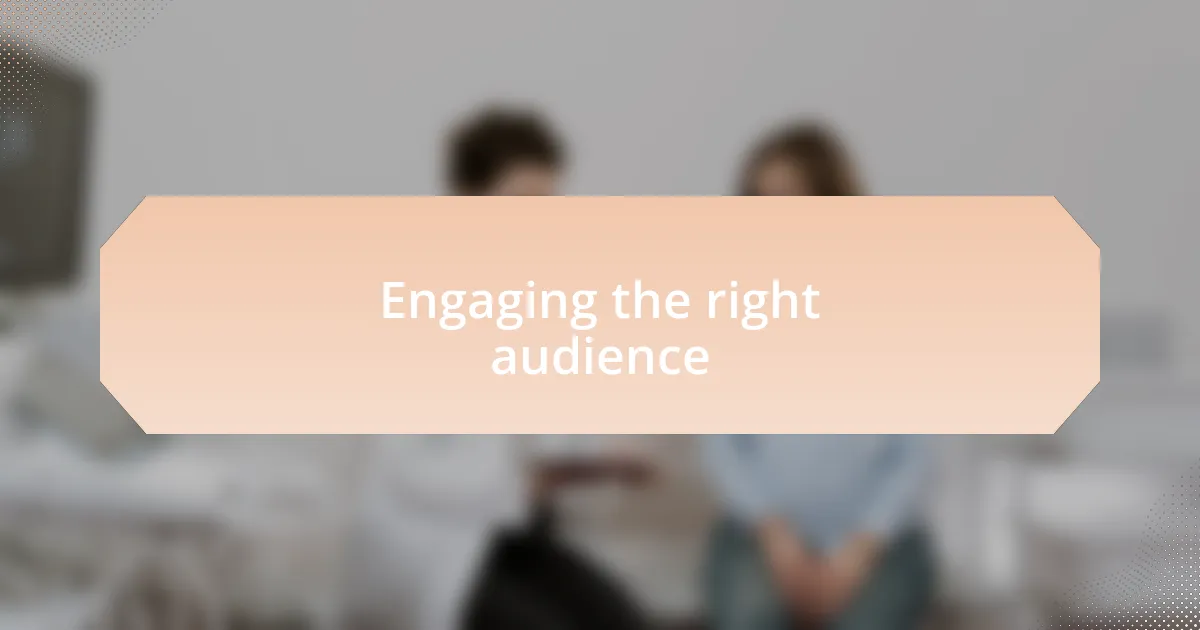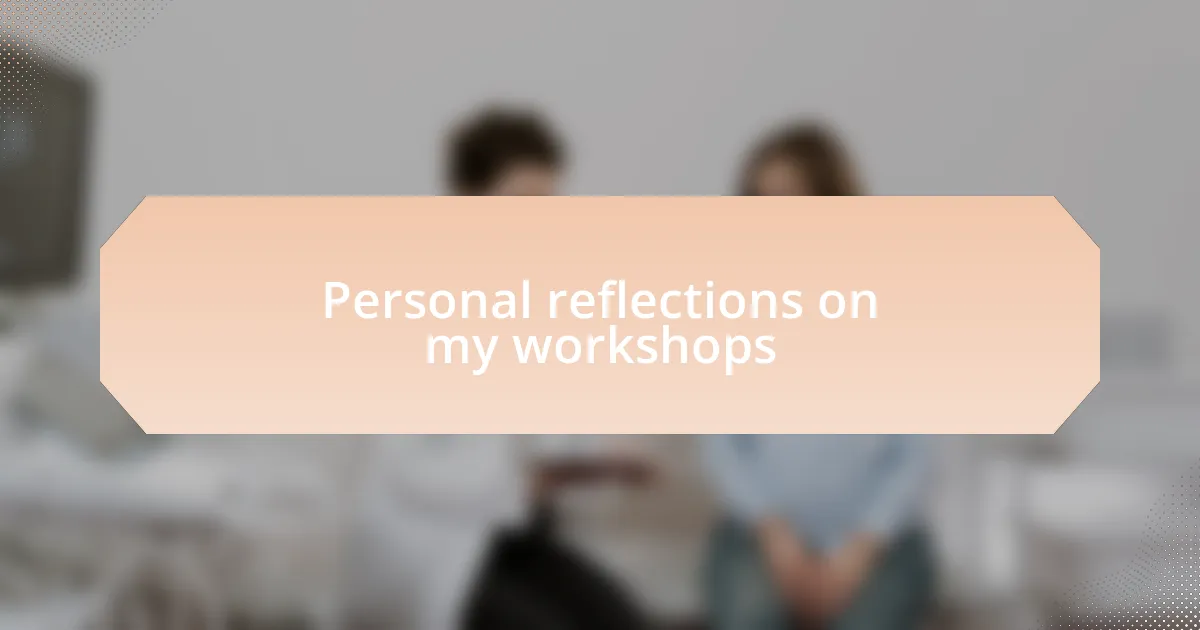Key takeaways:
- Hospital ministry focuses on providing spiritual support and emotional care to patients, families, and healthcare staff, emphasizing the importance of presence and listening.
- Workshops enhance ministry effectiveness through collaboration, skill development, and fostering a sense of community, leading to empowered volunteers.
- Successful workshops require careful planning around audience needs, incorporating real-life scenarios, and ensuring ongoing engagement to build a lasting community.
- Creating effective workshop content involves clear structure, emotional connection, and interactivity to engage participants meaningfully.

Understanding hospital ministry
Hospital ministry is a vital aspect of healthcare that focuses on offering spiritual support and comfort to patients, families, and staff. I vividly recall a moment in the hospital chapel when a family, overwhelmed with grief, found solace in prayer—it was a reminder of how crucial emotional and spiritual care is during difficult times. Have you ever considered how a few comforting words or a listening ear can make a world of difference in someone’s healing journey?
In my experience, hospital ministry isn’t just about delivering religious messages; it’s about being present, listening attentively, and understanding the unique struggles each individual faces. I remember a nurse who shared how a simple check-in by a chaplain helped her feel valued during a stressful shift. Isn’t it fascinating how small gestures can foster a supportive community within the hospital environment?
Moreover, the role of hospital ministry transcends religious boundaries, encompassing a broad spectrum of beliefs and backgrounds. I’ve seen individuals from various faiths seeking connection, reminding us that everyone is on their own spiritual path. How does this openness influence the way we minister to those in need? It encourages us to be more compassionate, understanding that healing often involves more than just physical recovery.

Importance of workshops in ministry
Workshops play a pivotal role in enhancing the effectiveness of ministry by fostering collaboration and skill development. I remember attending a workshop where different hospital ministry teams came together to share their experiences and strategies. It was an eye-opener to see the diverse ways individuals approached similar challenges. Have you ever thought about how exchanging ideas can spark innovation and ignite passion in your ministry efforts?
Through workshops, we create a space for participants to explore new methods of outreach and spiritual care. I once facilitated a session focused on grief counseling, and it was remarkable to witness volunteers gain confidence as they practiced their skills. Seeing the transformation in their approach was more than encouraging; it was palpable. Can you imagine the impact of equipped volunteers who feel ready to support families during their hardest moments?
Moreover, workshops cultivate a sense of community among attendees, which is essential in ministry work. I have watched as relationships formed over shared learning experiences, leading to lasting partnerships both within and outside the hospital. Isn’t it powerful when collaboration and camaraderie enhance our ability to serve? These connections not only enrich individual efforts but also create a unified mission that resonates deeply with those we serve.

Planning successful workshop topics
When planning successful workshop topics, it’s crucial to align them with the needs and interests of your audience. During one workshop I planned, I reached out to participants beforehand to understand their challenges in hospital ministry. This input not only shaped the direction of the topics but also ensured everyone felt invested and engaged during the discussions.
I find that incorporating real-life scenarios into our workshop agendas makes a significant difference. For instance, I once focused an entire session on ethical dilemmas faced by hospital chaplains. By discussing actual cases, attendees were able to engage in meaningful dialogue, sharing their insights and experiences. It’s fascinating how these shared narratives can illuminate pathways to solutions. Have you considered how storytelling can transform the way we approach sensitive subjects in ministry?
The impact of well-planned topics doesn’t just stop at the workshop itself. After a session on effective communication with patients, I received feedback that many participants felt more equipped to navigate challenging conversations. This revelation reaffirmed my belief that when we carefully curate workshop topics, we empower individuals to make real changes in their ministry practice. Have you ever witnessed the ripple effect of knowledge being shared and applied in such powerful ways?

Engaging the right audience
Engaging the right audience starts with understanding who they are and what they value. I remember a time when I organized a workshop specifically for volunteers in hospital ministry. By creating tailored invitations that highlighted their unique contributions, I ensured a turnout that reflected not just interest, but a sense of ownership in the event. How often do we actually consider what excites or motivates our audience before extending an invitation?
Another key element is fostering an inclusive environment where everyone feels comfortable sharing. During one workshop, I implemented small group discussions, which allowed participants to express their thoughts without the pressure of a larger audience. I witnessed firsthand how this approach encouraged quieter voices to emerge, leading to richer conversations. It begs the question: are we creating spaces that genuinely welcome diverse perspectives?
Lastly, it’s essential to maintain ongoing engagement beyond the initial workshop. I once followed up with participants through personalized emails, inviting them to continue the discussion on specific topics we had touched on. This not only reinforced their learning but also built a community around shared experiences and challenges. Have you ever thought about how continuous engagement could transform the way our ministries operate?

Creating effective workshop content
Creating effective workshop content hinges on identifying the core objectives of your session. I vividly recall planning a workshop centered around grief support, where I made it a point to anchor the content in real-life scenarios that participants could relate to. By weaving in stories from my own experiences, I not only humanized the material but also sparked meaningful reflections among attendees. What happens when we connect emotionally with our content? It transforms the workshop from a simple knowledge transfer into a powerful shared journey.
Next, structuring the workshop content for clarity and flow is crucial. During one session, I organized the material into distinct segments—beginning with an introduction, followed by deep dives into specific topics, and culminating with a reflective discussion. This format allowed participants to digest information methodically, making it easier for them to apply what they learned. Have you ever noticed how a well-structured session can silence the distractions around us and keep everyone engaged?
Moreover, integrating interactive elements can significantly enhance participant investment in the material. For example, I decided to incorporate live polls and small group breakouts in a recent workshop on volunteer leadership. Watching participants engage with the content and share their insights in real time was incredibly rewarding. It raises an important consideration: how do we truly engage participants in a way that strengthens their connection to the material and to each other?

Promoting your workshop
Promoting your workshop effectively can mean the difference between a full room and an empty one. I remember a time when I advertised a community health workshop and decided to leverage local social media groups. It was thrilling to watch registrations pour in as people shared the post with their friends and family. Have you ever considered how a simple digital shout-out can transform interest into action?
Another strategy I’ve found invaluable is creating visually appealing promotional materials. On one occasion, I teamed up with a graphic designer to craft eye-catching flyers that not only highlighted key workshop details but also captured the essence of the mission. This was more than just aesthetics; it made people stop scrolling and take notice. What visuals resonate with your audience? Identifying this can be key to enhancing your outreach.
Don’t underestimate the power of personal invitations. I’ve often reached out directly to church leaders or community figures whose presence could enrich the workshop experience. It’s amazing how a single phone call or a meaningful conversation can forge connections and ignite shared enthusiasm for the event. Have you ever seen how a personal touch can create a ripple effect in community engagement?

Personal reflections on my workshops
Reflecting on my workshops, I’ve come to realize how every event is a unique journey. I recall a particularly intense session where participants shared their fears about illness and faith. Hearing their stories brought an unexpected depth to our discussions, reminding me how vital it is to create a safe space for vulnerability and healing. Have you ever felt that moment when a shared experience transforms a group into a family?
One workshop that stands out was centered around resilience in the face of adversity. I remember guiding a group exercise where we wrote down our struggles and then shared them. The room felt heavy with emotion, yet there was a profound sense of camaraderie that emerged. I could see participants nodding in agreement, acknowledging that they weren’t alone in their battles. How often do we discover strength in our shared vulnerabilities?
As I think back on these experiences, I realize that the feedback I received often surprised me. One participant mentioned that my authenticity inspired them to open up about their own journey. It’s moments like these that affirm my purpose in leading these workshops, reminding me that behind every statistic, there’s a personal story waiting to be told. What stories are waiting to be uncovered in your own events?